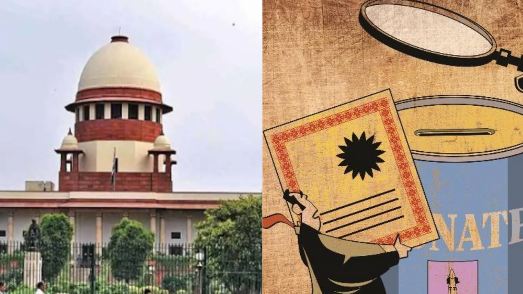The three-judge bench of the Supreme Court headed by outgoing CJI SA Bobde on Wednesday asked the central government to look into the potential misuse of Electoral bonds funds. The bench also reserved its order in an application filed by the NGO Association for Democratic Reforms seeking an interim direction to bar the sale of electoral bonds. Asking tough questions, the SC remarked that the electoral bonds could be used by political parties to fund protests and possibly terrorist activities across the country.
“Suppose there is a political party which wants to buy electoral bonds and finance a protest. What is the control of the government on how the money is put to use? A party receives electoral bonds worth 100 crores — what is the guarantee that they will use the entire funds for political purpose alone and not for terrorism or other activities?” said the bench.
SA Bobde observed that political parties can use the electoral bonds to fund their political agendas and further directed the government to look into the matter urgently.
“Funds can be misused… We would like you, as the government, to look into that aspect. They (political parties) can use the funds for activities outside their political agenda… along with election expenditure, you (a political party) can also start a violent protest,” said CJI Bobde, whilst addressing Attorney General K.K. Venugopal.
Chief Justice Bobde then asked whether the purchasers of electoral bonds disclosed whether the money paid was black or white. “When a businessman goes and buys bonds, does he have to disclose whether he purchases them with white or black money? Does he have to pay tax?” the Chief Justice asked Mr Venugopal.
Interestingly, the party batting for a ban on electoral bonds was represented by Prashant Bhushan who wants the ban to come into effect before the elections in West Bengal and Tamil Nadu.
Lately, with the farmer’s protest and the entire anti-CAA protests, it has been found on regular occurrences that opposition political parties, in an attempt to corner the central government, have routinely through the back doors funded the protests. More and more big donors of political parties, including corporates, are using the electoral bond route for making large-sized donations due to the anonymity it provides to the donors.
The annual audit reports for 2018-19 of seven political parties, as published by the Election Commission of India (ECI), shows that they have received more than 50 per cent of their donations through electoral bonds.
While some political parties call for a ban on the EB route in public. However, behind the curtains, these same parties are the ones that funnel money through this route. Until the SC comes out with any judgement, all these ‘holier-than-thou’ parties need to practice what they preach or otherwise drop the charade of being the good Samaritans.
